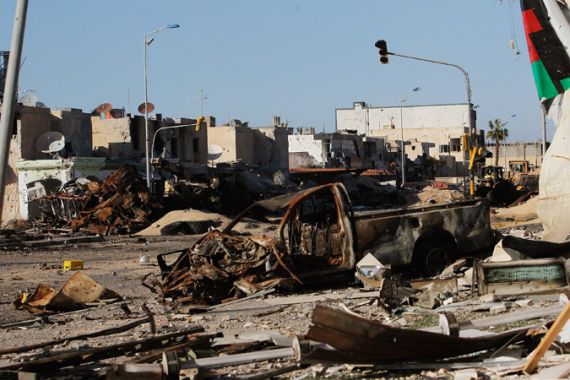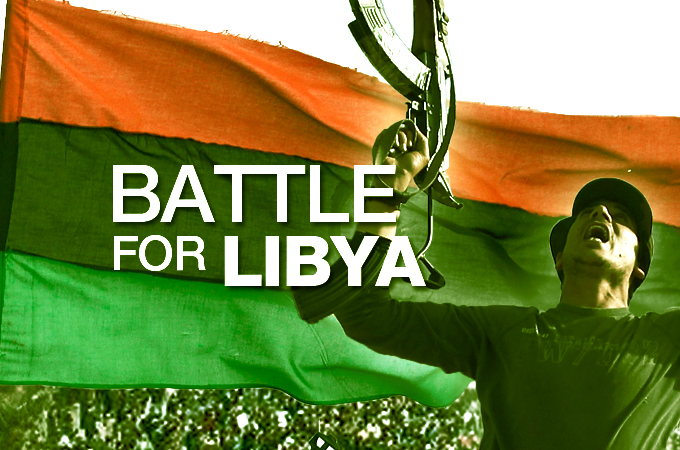Mortars pound Misurata as toll mounts
Western Libyan city reels from attack while rebels take control of key crossing along Tunisia border.

| The UN agency for children said injuries on civilians will continue in Misurata unless there is a ceasefire [Al Jazeera] |
Civilians have been caught in the crossfire in Misurata as the city continues to come under intense fire from forces loyal to Libyan leader Muammar Gaddafi.
Mortar fire poured on Thursday into the besieged city, the only rebel stronghold in the country’s west.
“Upto 50 or 60 people… are being injured per day,” Mohammed Al Fagieh, chief surgeon at a hospital in Misurata, told Al Jazeera.
“I’m talking about the hospital, I’m not talking about Misurata. The number might double or triple sometimes.”
Hundreds of people are reported to have been killed in the weeks of attacks, with at least five civilians left dead after fighting on Wednesday.
Among the casualties were Western journalists Chris Hondros and Tim Hetherington, both photojournalists, who died in the fighting in Misurata on Wednesday, doctors at a hospital in the city said.
Meanwhile, Ban Ki-moon, the UN secretary-general, has urged the Libyan authorities to “stop fighting and stop killing people” and said the world body’s priority was to secure a ceasefire.
“At this time our priority is to bring about a verifiable and effective ceasefire, and then we can expand our humanitarian assistance, and we are going to engage in political dialogue,” Ban said during an official visit to Moscow, the Russian capital.
Signs of ‘war crimes’
The United Nations has said it is looking for signs of war crimes in Libya. However, the UN humanitarian chief Valerie Amos said the situation has not yet reached the point where the UN needs NATO troops to secure humanitarian supplies in the country.
 |
| Keep up with all the latest developments here |
“At the moment, we have an agreement with the European force and with NATO that should we reach a point where the utilisation of civilian assets becomes impossible because of the security situation, we, the UN, would call on them for support for military assets.”
In further signs of hardship, however, long queues have formed for petrol while electricity has been cut so residents have to depend on generators.
The government denies it is attacking civilians in Misurata.
Contention over foreign forces
Abdel Hafiz Ghoga, the Benghazi-based spokesperson of Libyan Transitional National Council, said that opposition forces would not object to the presence of foreign ground forces to protect a safe haven for civilians.
“Protecting civilians requires having safe passages to deliver humanitarian supplies,” he said.
“If that [protecting civilians] does not come except through ground forces that will ensure this safe haven, then there is no harm in that at all.”
Al Jazeera’s Sue Torton, reporting from the opposition stronghold of Benghazi, said many Libyans are looking abroad to see when international help will come.
“There has been talk of possibly foreign troops on the ground. Whether or not foreign troops are allowed on this soil is still a matter of contention. I’ve been told by the national council that maybe those troops could be provided by some of the Arab countries rather than the European countries.”
However, David Cameron, the British prime minister, insisted on Thursday that NATO isn’t edging toward the deployment of ground troops in Libya despite the decision by several European nations to send military advisers to assist rebel forces.
“The UN Security Council does limit us. We’re not allowed, rightly, to have an invading army, or an occupying army,” Cameron told BBC Scotland radio.
“That’s not what we want, that’s not what the Libyans want, that’s not what the world wants.”
While Russia said the sending of advisers exceeded the UN Security Council mandate to protect civilians.
“We are not happy about the latest events in Libya, which are pulling the international community into a conflict on the ground. This may have unpredictable consequences,” Sergei Lavrov, foreign minister, said.
Border crossing seized
Meanwhile, pro-democracy forces took control of the Libyan side of a key border crossing with Tunisia, in a remote western region where they have been fighting government troops.
Witnesses say pro-Gaddafi forces abandoned their weapons and fled into Tunisia.
 |
| Click on image for comprehensive coverage on Libya |
Our correspondent in Benghazi said there was fierce fighting before pro-democracy forces were able to seize control of the post.
“The post … has some 6,000 Libyans trying to get into Tunisia trying to flee the fighting here. People are camped out there,” she said.
“We’re also hearing from the national council here that this isn’t the first time that they’ve taken control of that outpost. They’re just watching to see whether Gaddafi forces strike back and try to take the post back again.”
Elsewhere in the country, Libyan state television said early on Thursday that NATO forces had struck the Khallat al-Farjan area of the capital Tripoli, killing seven people and wounding 18 others. The report could not immediately be independently verified.
But NATO has denied that an alliance air raid killed civilians, saying the target was a command and control bunker in a military compound.
“There was a NATO air strike in the broader area of Khellat Al-Ferjan,” a NATO official told AFP news agency on condition of anonymity.
International forces have been carrying out air strikes on forces loyal to Gaddafi since March 19, in a mission headed by NATO since March 31.
The NATO-led coalition is enforcing a UN mandated no-fly zone in Libya, which authorises “all necessary measures” to protect civilians from attack by Gaddafi’s forces.
It is also policing an arms embargo and has targeted Gaddafi’s military infrastructure.
The rebels have been trying since mid-February to end Gaddafi’s 41-year-old rule but have struggled against his more experienced and better equipped forces.